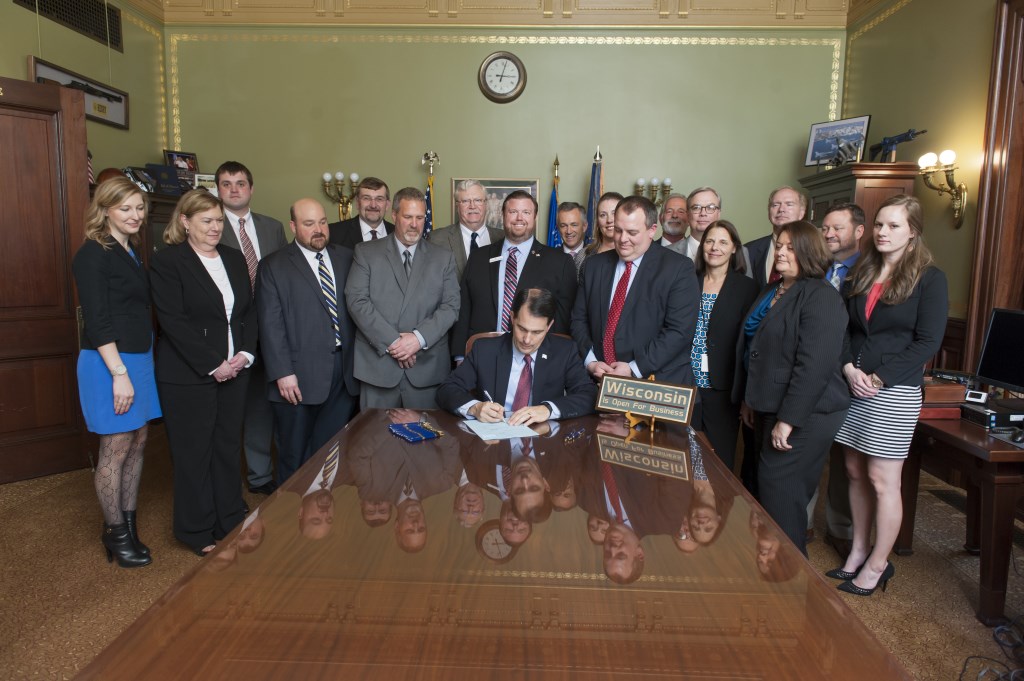12 Key State Budget Decisions
Do you agree or disagree? Here’s your chance to make a difference.
Today, 16 legislators on the Joint Finance Committee begin voting on the 2017-19 state budget. The easy stuff will be resolved first; the hardest decisions won’t be made until mid-June.
But why should those 16 – 12 Republicans and four Democrats – have all the fun? You should also be able to take positions on the same questions that legislators will ultimately have to confront – most of which are in the budget that Republican Gov. Scott Walker announced in February.
So, here are 12 policy decisions Walker asked Republicans, who control the Legislature, to make. Do you agree or disagree?
- Income tax cut: Should tax rates be reduced for taxpayers in the lowest two tax brackets in each of the next two years? Walker’s proposed cut would help married taxpayers filing jointly with taxable incomes of up to $37,450 in 2017, and up to $38,420 in 2018. The tax cuts will average about $44 per taxpayer and save them $203 million over the next two years. But that’s money that won’t be available for K-12 schools, for Medicaid, to subsidize the UW System or help pay for local government services. Yes/No
- UW tuition freeze: Should a four-year freeze on resident undergraduate tuition on UW campuses continue for a fifth year? Yes/No
- UW tuition cut: Should resident undergraduate tuition on UW campuses be cut by 5 percent in the 2018-19 school year? The cut would save UW students and their parents about $35 million, which Walker’s budget replaces with state tax dollars. Yes/No
- Self-insure for health care: Beginning Jan. 1, should state government self-insure for health care for employees and retirees? The governor’s budget assumes that will save $60 million over 18 months, and spends that money on aid to K-12 schools and pay raises for UW System employees. Opponents of self-insuring call it risky and warn that it could end up costing much more than the current system. Yes/No
- End property tax levy for forestry: The governor wants state government to end the property tax levy that buys, preserves and develops forests. Approving Walker’s change would save property owners $180 million over the next two years. But there is no guarantee of how much – if any – of that forestry funding will be replaced. Yes/No
- Highway funding: Walker’s budget does not raise either the 30.9-cent per gallon gas tax, which has not been increased since 2006, or the $75 annual vehicle registration, unchanged since 2008. Instead, the governor’s budget would borrow $500 million more by mid-2019 to keep some major highway projects on schedule and would delay dozens of others for decades. Yes/No
- Food stamp work requirement: Walker is recommending a pilot program that would require “able-bodied” adults with children between ages 6 and 17 to either work or be in job-training programs, and to undergo drug testing, to continue to receive Food Stamps. Yes/No
- Required hours of instruction: Walker wants to repeal requirements that public-schools must offer specific hours of instruction annually – kindergarten, 437 hours; grades 1 through 6, 1,050 hours, and grades 7 through 12, 1,137 hours. Walker says the emphasis should be on the quality of instruction, not counting hours. Yes/No
- School district health-care costs: The governor says only school districts that require their employees to pay 12 percent of health-care costs should qualify for $200-per-pupil increases in state aid next year. Yes/No
- Lifetime teaching licenses: The governor’s budget would eliminate the requirement that educators and administrators be relicensed every five years. Instead, school districts would have to conduct criminal background checks on licensed employees every five years. The change would save $1.7 million, and eliminate 10 jobs, by mid-2019. Yes/No
- Farm-to-school program: Should the state program created to help provide schools with locally produced fruits, vegetables and dairy products be eliminated, saving one full-time job and $132,800 over the next two years? Yes/No
- DNR magazine: Walker wants DNR to stop publishing the Natural Resources magazine, which costs no tax funds because subscribers and those buying some licenses pay for it. About 83,800 copies of the magazine’s December issue were printed. Ending the magazine would result in a two-year reduction in DNR’s budget of $681,000. Yes/No
Now it’s your turn; do you agree or disagree? Then make your opinions know to your representatives. (You could even send a copy of this column with your answers circled.) Legislators aren’t much different than you and me. They just have titles – “Senator” and “Representative” – before their names, which they hope not to lose. Which is why they’ll take your feedback seriously.
Steven Walters is a senior producer for the nonprofit public affairs channel WisconsinEye. Contact him at stevenscwalters@gmail.com
The State of Politics
-
A Wisconsin Political Trivia Quiz
 Dec 15th, 2025 by Steven Walters
Dec 15th, 2025 by Steven Walters
-
The Fight Over Wisconsin’s House Districts
 Dec 8th, 2025 by Steven Walters
Dec 8th, 2025 by Steven Walters
-
The Battle Over On-Line Betting
 Nov 24th, 2025 by Steven Walters
Nov 24th, 2025 by Steven Walters






















